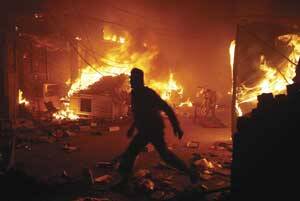Catholics in northern Pakistan are preparing for quiet, scaled-back Christmas celebrations as militant attacks continue to terrorize the country.
“Most of the scheduled programs are canceled due to this situation,” said Archbishop Lawrence Saldanha of Lahore, the capital of Punjab Province, on Dec. 7. Celebrations will be more of a family affair with little “pomp and display outside,” he added.
“This will be a silent Christmas. We shall discover the meaning of Christmas in a quiet way and hope for the return of harmony and peace,” the archbishop said. But that evening, just hours after he spoke, two bomb blasts ripped through a busy market in the center of Lahore. Forty-nine people were killed and scores injured.
A wave of deadly bombings has rocked the country since the Pakistani army launched an operation in mid-October against Taliban militants in the neighboring North-West Frontier Province, which borders Afghanistan. Another blast on Dec. 7 outside a district courthouse in that province’s capital, Peshawar, killed at least 11 people and injured 44 others.
A catechist who did not wish to be identified said that two Catholic churches in Peshawar, the city worst hit by militant attacks in Pakistan, have canceled Christmas celebrations. “Masses will be conducted but not the traditional fairs. We are praying every day for the improvement of the situation and peace in the country,” he said.
The outdoor Christmas fair at the Cathedral of Sts. Peter and Paul in Faisalabad also has been called off. “The annual diocesan choir event formerly attended by thousands in the open cathedral compound will now be limited only to the cathedral building,” said the Rev. Khalid Rashid Asi, vicar general of the Diocese of Faisalabad. “We are very cautious, and all programs are being organized...on a low scale.”
On Dec. 4 an explosion at a mosque in Rawalpindi killed 40 people and injured 83 others. Rawalpindi houses the headquarters of the Pakistani army, and among those killed were high-ranking army officers. Mean-while, prominent Muslim clerics have issued a religious edict declaring suicide attacks and bomb blasts “un-Islamic.”
The Human Rights Commission of Pakistan called the series of bomb attacks “devastating.” “Children and women have been most vulnerable to the excesses of militants.”
The commission also expressed concern that the Pakistani military was committing human rights violations as it responded to the unprecedented violence and in continuing operations against Pakistan’s Taliban and its sympathizers. “The so-called counter-insurgency operations carried out by the military and paramilitary forces have used heavy artillery, killing an unknown number of civilians,” the group alleged.








